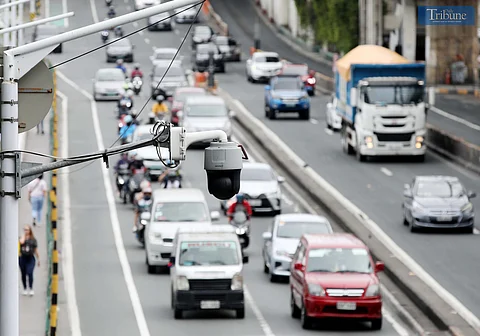
- NEWS
- the EDIT
- COMMENTARY
- BUSINESS
- LIFE
- SHOW
- ACTION
- GLOBAL GOALS
- SNAPS
- DYARYO TIRADA
- MORE

The Metropolitan Manila Development Authority (MMDA) is ramping up its efforts to ensure smoother traffic enforcement and management ahead of the two-year EDSA rehabilitation project starting on 13 June.
The MMDA has provided updates to the No Contact Apprehension Policy (NCAP), as well as new traffic schemes and proposals to adjust lane usage on EDSA.
A new MMDA mobile application set to launch in two weeks will allow registered vehicle owners to check in a secure manner if they have any NCAP violations using a one-time password.
“The only person who can search or inquire is the registered owner of the vehicle, and he or she will have a one-time password,” said MMDA Traffic Enforcement Group Director Victor Nuñez in a Palace briefing.
The app will be similar to the MMDA’s previous MayHuliKa.com site but will have stronger privacy safeguards in compliance with the Data Privacy Act of 2012.
“Before, anyone who knew a vehicle’s plate number could just type and search. That would be a violation of the Data Privacy Act,” Nuñez said.
The NCAP, which was resumed after the Supreme Court partially lifted a 2022 temporary restraining order, has led to a sharp decline in traffic violations.
From the previous 3,000 daily infractions, only 1,112 violations were recorded on the first day of the NCAP’s return, with the numbers dropping to 952 and 797 on the following days.
MMDA Chairperson Romando Artes emphasized that all NCAP-detected violations will undergo a manual review before tickets will be issued. Motorists may pay the fines online or at MMDA offices, and they have the option to contest the violations.
Still, concerns persist over the policy’s fairness, particularly for public utility vehicles, where the registered owners — not the drivers — will be held financially responsible. Several transport groups have questioned the policy’s constitutionality.
Addressing another concern, Nuñez appealed to drivers of emergency vehicles not to misuse their privileges. “If there is no emergency, follow traffic rules and don’t abuse the privilege given by the government,” he said.
While ambulances, fire trucks and police vehicles are exempt from NCAP, Nuñez clarified that the system doesn’t automatically detect such exemptions. This has prompted the MMDA to closely monitor vehicles with ambulance markings, especially those operated by funeral services.
“There are vehicles that have ambulance markings but are being used to fetch cadavers, not patients. We have to validate if they are legitimate,” he said.
MMDA’s Special Operations Group also extends a courtesy to private responders and volunteer emergency groups, urging mutual cooperation to avoid delays in public service.
As part of the broader traffic mitigation during the EDSA reconstruction, the agency is considering converting some protected bike lanes into shared lanes with motorcycles during peak hours or congested traffic.
Nuñez said the idea is still under consultation and no final decision has been made. “We cannot make a final decision since we haven’t met with the mobility and bikers groups,” he said.
The EDSA project will close one lane of the thoroughfare at a time, and its duration — expected to stretch over two years — will require coordinated solutions from all road users.
Ahead of the rehab, the MMDA will pilot-test an odd-even vehicle scheme along EDSA starting 16 June. Artes said the dry run will last a month, after which the agency will assess its effectiveness.
